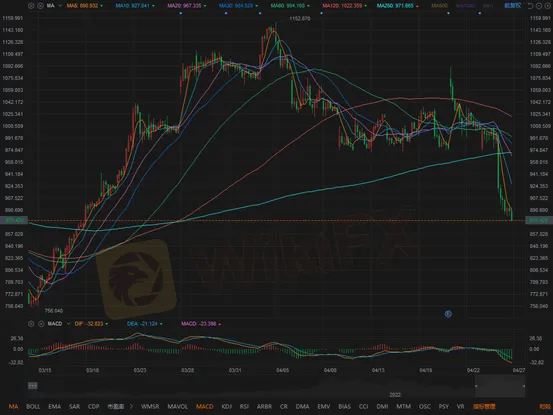简体中文
繁體中文
English
Pусский
日本語
ภาษาไทย
Tiếng Việt
Bahasa Indonesia
Español
हिन्दी
Filippiiniläinen
Français
Deutsch
Português
Türkçe
한국어
العربية
Global stock markets suffered heavy losses across the board, Tesla plummeted 12% to lead technology stocks
Abstract:Global stock markets suffered heavy losses across the board, Tesla plummeted 12% to lead technology stocks
Fed Chairman Jerome Powell already announced a rate hike in March, the first time since at least 1994 that the central bank has started a rate hike cycle within a month of a massive stock market sell-off. Investors were concerned about the outlook for the global economy and the Fed's accelerated monetary tightening.
The three major U.S. stock indexes suffered heavy losses across the board. As of Wednesday's close, the NASDAQ had hit a new low for the year, and the Dow Jones Industrial Average fell 2.38% to 33,240.18 points. The Nasdaq Composite fell 3.95 percent to 12,490.74. The U.S. Standard & Poor's 500 index fell 2.81% to 4,175.20 points. The NASDAQ, which is dominated by technology stocks, fell by nearly 4%, and star technologies such as Microsoft, Netflix, Meta, and Google were also “sold”. On Tuesday, after Twitter accepted Musk's acquisition agreement, Tesla's stock price plummeted more than 12%, wiping more than $100 billion in market value. As of the close of the day, Twitter's stock price also fell more than 3%.

The International Monetary Fund (IMF) lowered its forecast for economic growth in the Asia-Pacific region this year. According to the latest forecast released by the agency, GDP in the Asia-Pacific region will grow by 4.9% in 2022, which is 0.5 percentage points lower than the growth forecast in January and lower than the growth rate of 6.5% last year. On Wednesday, the Asia-Pacific stock markets fell collectively, taking over the overnight decline in U.S. stocks. The Japanese and South Korean stock markets both closed down more than 1%, and the Vietnam VN30 index fell more than 2% during the session. The Nikkei 225 fell 1.17% to close at 26,386.63. Securities, transportation equipment, banking, steel, and textile stocks were among the top losers, while shipping stocks rose sharply. South Korea's KOSPI fell 1.10% to end at 2,639.06.
In terms of Southeast Asian and South Asian markets, as of the time of writing, Singapore's Straits Times Index fell 0.14%; Vietnam's VN30 Index fell 1.54%; Indonesia's Jakarta Composite Index fell 0.68%; Thailand's SET Index fell 0.43%; Philippine Composite Index fell 2.00%; India Mumbai 30 fell 0.88%; Malaysia's Kuala Lumpur Composite Index fell 0.48%.
(The above analysis only represents the analyst's point of view, the forex market is risky, and investment should be cautious)
Disclaimer:
The views in this article only represent the author's personal views, and do not constitute investment advice on this platform. This platform does not guarantee the accuracy, completeness and timeliness of the information in the article, and will not be liable for any loss caused by the use of or reliance on the information in the article.
Read more
Fed Chair Powell says more action may be needed to fend off lasting economic damage - Business Insider
"While the economic response has been both timely and appropriately large, it may not be the final chapter," Powell said.
Fed Chair Powell says more action may be needed to fend of economic ruin - Business Insider
"While the economic response has been both timely and appropriately large, it may not be the final chapter," Powell said.
6 Fed officials comment on economic rebound, unemployment, stimulus - Business Insider
Several officials agreed that the Fed's relief efforts — while necessary — pose economic risks if they go unchecked and aren't appropriately reversed.
Fed chair Powell: Economy may need 'more support' for robust recovery - Business Insider
The Federal Reserve left interest rates untouched and near zero Wednesday amid coronavirus pandemic.
WikiFX Broker
Latest News
Think Before You Click: Malaysian Loses RM240,000 to Investment Scam
Ghana Trader Jailed for $300K Forex and Crypto Scam
What Are The Top 5 Cryptocurrency Predictions For 2025?
Lawsuit Filed Against PayPal Over Honey’s Affiliate Fraud
XRP Price Prediction for 2025: Will It Hit $4.30 or More?
Dr. Sandip Ghosh, Ex-RG Kar Principal, Involved in Multi-Crore Scam
OPEC's Profound Influence on the Oil Market
Just2Trade: SAFE or SCAM?
The January Effect of 2025 in Forex Markets
New York becomes first US city with congestion charge
Currency Calculator






